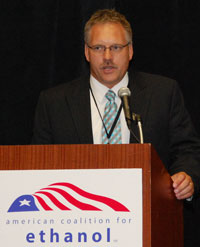Good news for biofuels this week as the California Department of Labor awarded the San Diego Biofuels Initiative a $4 million grant to train workers to join the biofuels workforce. The award was given through the “Green Innovation Challenge,” a green jobs initiative that is overseen by the state’s Department of Labor.
According to an article on SanDiego.com, the San Diego area is a hotbed for biofuels companies. There are nearly 30 businesses engaged in biofuels development, with many of these companies focused on algae. Two of the most notable companies in the region are Synthetic Genomics and Sapphire Energy. Both companies have received funding from oil companies and both companies believe they will be producing biodiesel from algae by next year.
 The San Diego Biofuels Initiative is a consortium of associations that include CleanTECH San Diego, BIOCOM, San Diego Regional EDC, San Diego Workforce Partnership and the San Diego Center for Algae Biotechnology (SD-CAB), located at UC San Diego.
The San Diego Biofuels Initiative is a consortium of associations that include CleanTECH San Diego, BIOCOM, San Diego Regional EDC, San Diego Workforce Partnership and the San Diego Center for Algae Biotechnology (SD-CAB), located at UC San Diego.
On another note, in June, SD-CAB received $9 million dollars to be dispersed over the next three years for research on algal biofuels from the Department of Energy.
According to a study released by the San Diego Association of Governments (SANDAG), algal biofuels research employs 410 scientists and other workers in San Diego but increases to 784 jobs when you include indirect jobs. The industry provides nearly $44.6 million in salaries and provides the region with $108.3 million in economic activity.


 Missouri Congressman Roy Blunt, fresh off a primary win to be the Republican candidate for Senator, stopped at the
Missouri Congressman Roy Blunt, fresh off a primary win to be the Republican candidate for Senator, stopped at the  Asked why he voted against a bill this year that would have reinstated the tax credit, Blunt replied that it included tax increases that he was against. “It’s not necessary to slow down one part of the economy in order to encourage another,” Blunt said. He is hopeful that there will be another vehicle to bring back the tax credit before the end of this Congress. “They’re talking now about an energy bill, sometimes called “Energy Light,” because it wouldn’t have the burdensome and ill-conceived cap and trade,” he said. “Hopefully, we can move forward with things that encourage all kinds of American energy.”
Asked why he voted against a bill this year that would have reinstated the tax credit, Blunt replied that it included tax increases that he was against. “It’s not necessary to slow down one part of the economy in order to encourage another,” Blunt said. He is hopeful that there will be another vehicle to bring back the tax credit before the end of this Congress. “They’re talking now about an energy bill, sometimes called “Energy Light,” because it wouldn’t have the burdensome and ill-conceived cap and trade,” he said. “Hopefully, we can move forward with things that encourage all kinds of American energy.” 
 NCGA President Darrin Ihnen, a grower from Hurley, S.D., addressed the conference on the organization’s efforts to promote ethanol and their work with ACE and other ethanol organizations to ensure ethanol supporters speak with a unified voice in Washington on issues important to the industry.
NCGA President Darrin Ihnen, a grower from Hurley, S.D., addressed the conference on the organization’s efforts to promote ethanol and their work with ACE and other ethanol organizations to ensure ethanol supporters speak with a unified voice in Washington on issues important to the industry.


